A Note for You, If You’re Having A Bad Day
Hi My Friend,
I read both The Power of Habit by Charles Duhigg and Atomic Habits by James Clear, and for what it's worth, I liked them. They both felt like they were written by white men (and that might be because they were!) (do you need me to explain this further? I go back and forth).1 I have a daydream that goes like this: If only I could do the same small things every day. Then I’d be a sort of happy I’ve never known. I’d be able to make good choices without thinking too much about them. Every day, I’d wake up and exercise, because I would be a person who woke up and exercised. I’d eat salads for lunch. I’d regularly practice piano. I’d have a “writing practice.” Everything would be easier.
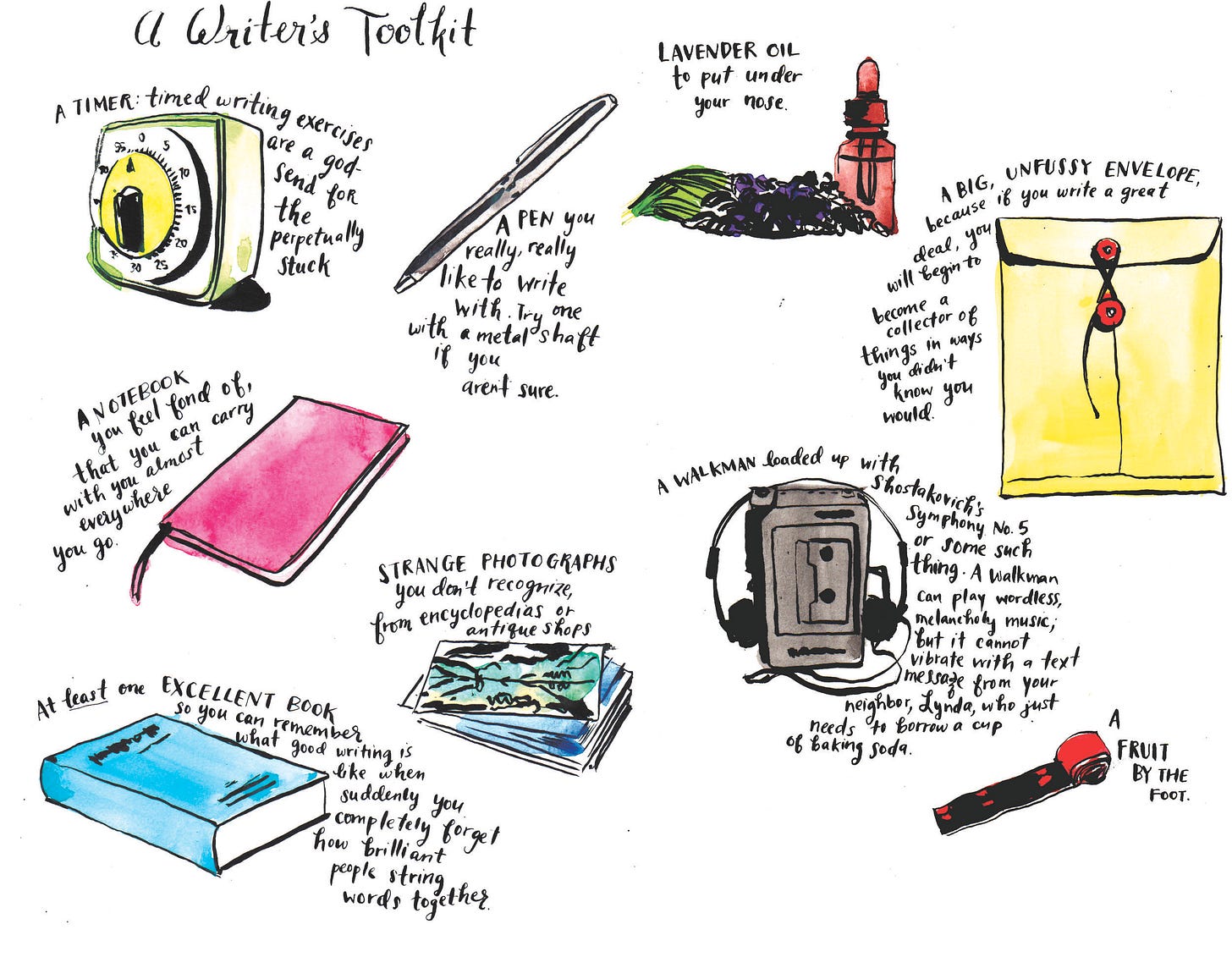
There are things about that life that would be easier. As a writer and artist, I’m asked occasionally about my writing practice. I talk about it as though the rules are unbreakable. I wake up at 5 and I journal. I work on my book in the morning, when my brain isn’t yet slushy. I get a long walk in, to think, before lunch. I write my newsletters on morning commute trains. Every night I put lavender oils on my feet and hum a church song and go to bed listening to poetry softly read to me from my phone.
These things are sometimes true. The journal habit is often true. The train-newsletter thing is usually how I do it. Right now, though, I’m writing from my dining room table.2 There are, arguably, more pressing things to be doing, but I had the thought a few minutes ago that spending some time writing to you would ease my grumpiness. Who writes at 1:29 in the afternoon while it’s sunny out? And yet, I do feel better right now than I did before I started writing to you. It’s a routine habit happening in a non-routine way. How rebellious.
Without going back to look through my copies of the habits books, I can summarize what I learned from them:
Change happens slowly. If you want to change, you have to figure out things you can do every day, so it might incrementally occur. You’re not going to become a giraffe overnight; it’s not possible. You’ll have to add one centemeter to your neck every day at 4 p.m., and eventually, you’ll look in the mirror and find you’re a giraffe. (The giraffe example is not meant to be rude; I am just SO TIRED of people talking about lifting weights or jumping rope for one uninterrupted minute, so I went with this. I feel like you understand the principle, and I want you to know that, while I understand that a person can’t really giraffe-ify themselves, I do earnestly think the principle is true.)
You should habit-bundle. That is: you already brush your teeth every day, so you should add the thing you want to do (get excellent at the accordion, so you can play it on your front porch in the summer for the neighborhood children) to the teeth-brushing. Like: keep your accordion next to your sink, and every time you go to brush your teeth, set a timer for fifteen minutes, and practice your accordion scales. Never brush your teeth without first practicing the accordion. (Again: I’m not trying to make fun of this concept. I use it! I write my newsletter on the train, where I already habitually am.)
Habits should be EASY, and they should be small. It’s unrealistic to ask yourself to clean your whole house every single night before bed, but you could spend ten minutes tidying.
There are other things that the habit gurus say, and the things are good things. Like I said: I liked these books! They are planful, and I adore a plan.
AND YET. When I’m most committed to my habits, my life moves too fast. Novel things don’t sneak up and surprise me as much. I’m too busy going to bed at 8 p.m. so I can wake up at 5 to write gratitude lists. And, hey, sure: in these moments of my life, I’m fine. I’m stable. Things are usually ok. And the things they say about habits become true, over time: my accordion-playing improves, the word count on my book racks up, the fiber in my diet makes itself known in its impolite ways. All good things.
There was this moment in Holly Gramazio’s novel The Husbands that struck me. The premise (you’ll need this for context): Lauren comes home one night, and finds she has a husband she didn’t have before. When the husband goes into the attic, he becomes a different husband. And this is true every time a husband goes into the attic: there are infinite new husbands. For a while, she is with a husband called Michael. In the world where she’s married to Michael, she’s been promoted; she is in a book club; she takes a HIIT class. Gramazio writes:
This is the life she would design if she was drunk and trying to think through the best possible version of who she could be. Exercise every morning and some evenings too, knowing what to do with root vegetables, spending a lot of time with her niece and nephew, staying in better touch with her mum, this is stuff she’s sure she’s written on intentional lists in the past, and now she’s doing it.
But — sometimes it’s too much. Lauren once fakes a work trip so she can stay in a hotel and watch YouTube videos in bed until three in the morning and forget to have dinner. On this trip, “she is not gentle and affectionate and careful and thoughtful with Michael and does not sit with him to talk through their days and share little moments (they eat at the table, every night they eat at the table, never once on the sofa with the television on).”
Never once on the sofa with the television on.
She doesn’t stay with Michael. She sends him back. And I thought, Of course she does. Who would want to live a life where you always had to be the best version of yourself?
Certainly, always being the best version of oneself would, in a way, maximize the limited time you have on earth. You could get so much more done, objectively, if you did it regularly, even on the hard days. But who made the decision that life should be about getting as much done as possible? Personally, I’d settle for getting some things done, while also having a lot of fun and getting a lot of rest.
Like all things, it’s a balance. I came up with this on a walk (on one of my writerly walks, which I’d say I take three times per week), and it serves me: To live well, you should 1) Build your house. (It’s a metaphorical house, obvs.) 2) Make it cozy. And 3) Leave it sometimes to see the rest of the world.
Build your house: Figure out the habits and routines that would maximize things: not only your productivity, but also your joy, your connection, your learning, your depth. Write the plan down on paper.
Make it cozy: Habits should be easy to do. Set up the plan so that you’re bundling new habits with old ones (old ones: making coffee, walking to the train station, dropping off your kid at daycare, eating lunch; new ones: giraffe-related, accordion-related, teapot-related). I keep my journal and seductive pen next to the coffee machine, so I can’t get coffee without moving my journal; and touching that pen makes me need to use it.
Leave it sometimes to see the rest of the world: Once you have established your home and your routine, seek out novel and joyful experiences. If the novel experiences mean you can’t stick to the routine, think of them as little vacations. No one stays home all the time. And when you’re out in the world, experiencing new things, don’t waste your energy feeling guilty that you didn’t get to the gym today (let’s face it: everyone seems to be trying to get to the gym); say out loud, “I’m on vacation right now, and it’s my sole job to enjoy it.”
You can’t be on vacation all the time; it’s good that you have a house to return to. You have a house of habits, and hey – it’s cozy! Return. Feel refreshed and renewed. You built this house for a reason.
Finally: I rebuild my house every six weeks. I sit down with my journal (which was just there, by the coffee maker), and write about how last season’s habits suited me, any new habits I’d like to try on. In winter, I loved sitting with a cup of tea at 4 p.m. and reading a book under a blanket – but it was dark early, then, and this particular lovely habit doesn’t make sense for sunny spring. In summer, I spend my gym hour working in the garden. I’m entering Week Six of strength training, and I haven’t really liked it. I’m happy to have given it six weeks. Next, I’m going to do something new with my body.
Progress is slower this way. But why shouldn’t progress be slow? There are flowers to smell, butter to melt, whims to follow. I’ve been considering the possibility that we’ve been mis-understanding the takeaway from the tortoise-and-the-hare story. The tortoise is slow and steady, and he wins the race. The hare is sometimes fast, distractible, and unpredictable, and he doesn’t win. He does, however, reach the end; and he also gets to take a nap. A lot of good things can come from a nap.
Love,
Sophie
Housekeeping:
ICYMI, last week I published a piece in
incredible Substack, . Here’s an excerpt, and here’s the link. Read it, please, and subscribe to her newsletter while you’re at it! It’s soft, bright, and a perfect companion on rainy days.This family – the one thatʼs all mashed up with relationships I was born into and relationships Iʼve chosen and relationships Iʼve stumbled upon and relationships Iʼve ended – keeps me alive. And I know for a fact that Iʼm not the only one who feels this way: I have heard it from so many people in my life, who gaze out at their own magnificent forests and see their many partners, their friends, the people they live with, the people they live far away from, their partnersʼ partners, their online social networks, their mentors, their students, their families of origin, their children and their spouses – but who donʼt see their families reflected in television or movies or books or large social studies. So many of us are starting to define our families differently, and we donʼt have anywhere to look to go, “Ah! So this is possible! My family is normal. My relationships are functional.ˮ
I’ve produced a small batch of “We Don’t Need Heroes; We Need Communities” prints. There are 50 in the run; I’ve priced them at $25 per signed and numbered print.
I’m leading a workshop for Cleaver Magazine this summer on how to write humor! I’ve led a number of workshops like these before, and they’re always incredibly fun: it’s such a joy to be silly with adults and laugh and play on the page. The class is $60, and I will make it worth it. If you’re interested, here’s the link to register.
Loose Thoughts
T loves pink roses — a flower I historically dislike. She always picks them out when we’re at Trader Joe’s, insisting on them. “Wouldn’t you like some nice ranunculus?” I ask her. This is meaningless to her, and also, no she would not. I’m staring at these roses right now, wondering what I dislike about them. They’re veiny, sort of like a short, petaled penis? Is that my issue? OR IS THAT THE APPEAL?!
My mom came to visit this week (hence the late email) and we went to see a movie and to eat expensive sushi. The movie was “La Chimera.” The sushi was cucumber.
Also, we are entering into birthday season in my household: Luke’s birthday, Brendan’s birthday, and my birthday are all stacked together on the calendar — right up against the end of the school year, which maybe isn’t super relevant to Brendan, but IS super relevant to me, a teacher of school. It’s always an intense, full couple of weeks. I went to sleep angry at myself for not going to the gym (it’s always the gym!) for over a week. Do you have a busiest time of the year?
What is your favorite flower of spring? My dahlia bulbs have been a bust so far; oh well. Someday I’ll grow a dahlia. Just not when I have toddler, is my guess.
I’ll explain further. While both writers have experienced their own setbacks, they talk about issues like making money, losing weight, and being productive as easy-to-understand and why-wouldn’t-everyone-just-want-this-y. Both writers lightly acknowledge their privilege, while also offering anecdotes about people with less privilege who “could do it, so why couldn’t you?” And, of course, there’s science and research and can-do-it-ness, and all that is fine, but it’s not for everyone!
Although, to be fair, it took me four calendar days to finish it, whereas on the train I can do this task on one commute.


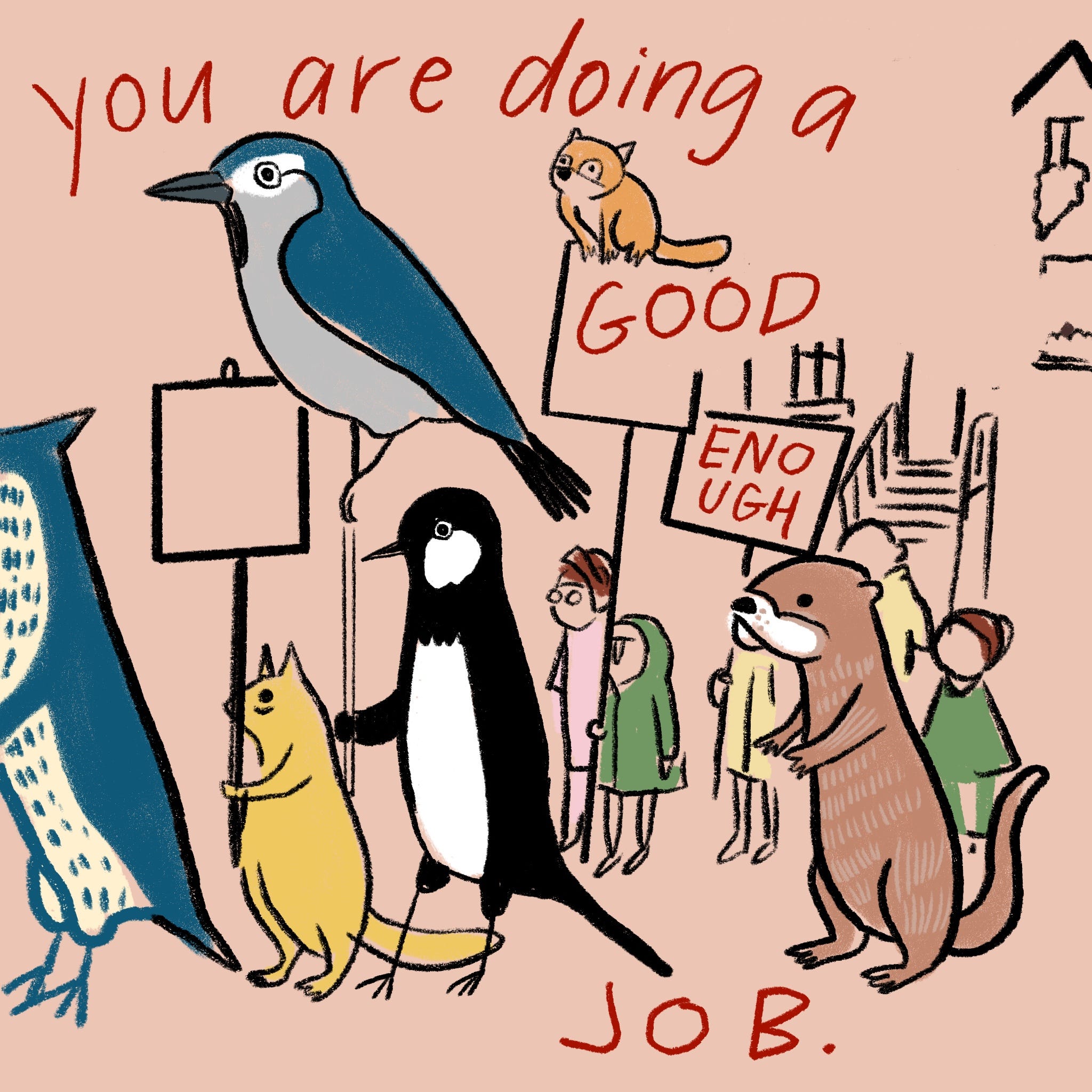
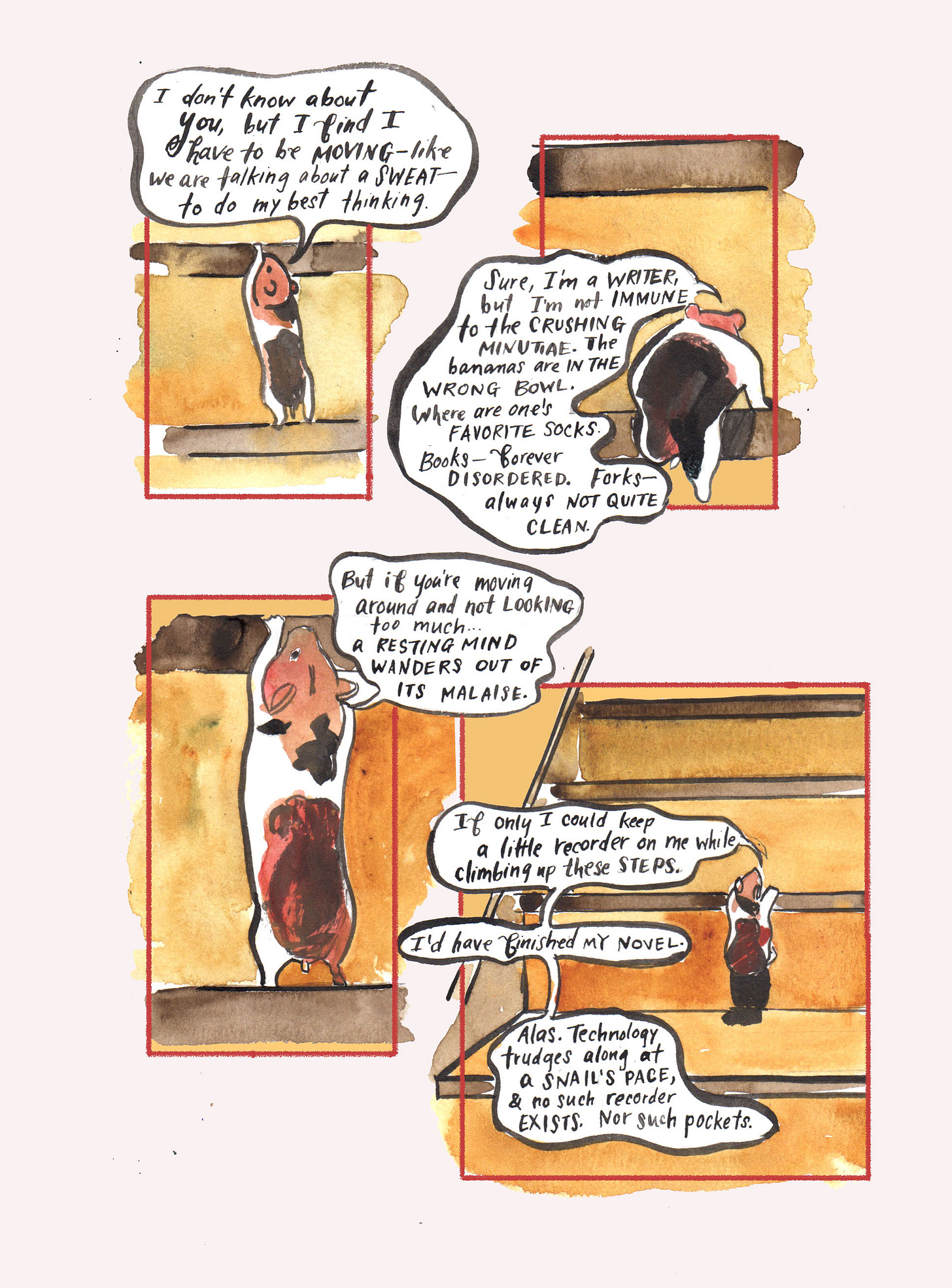

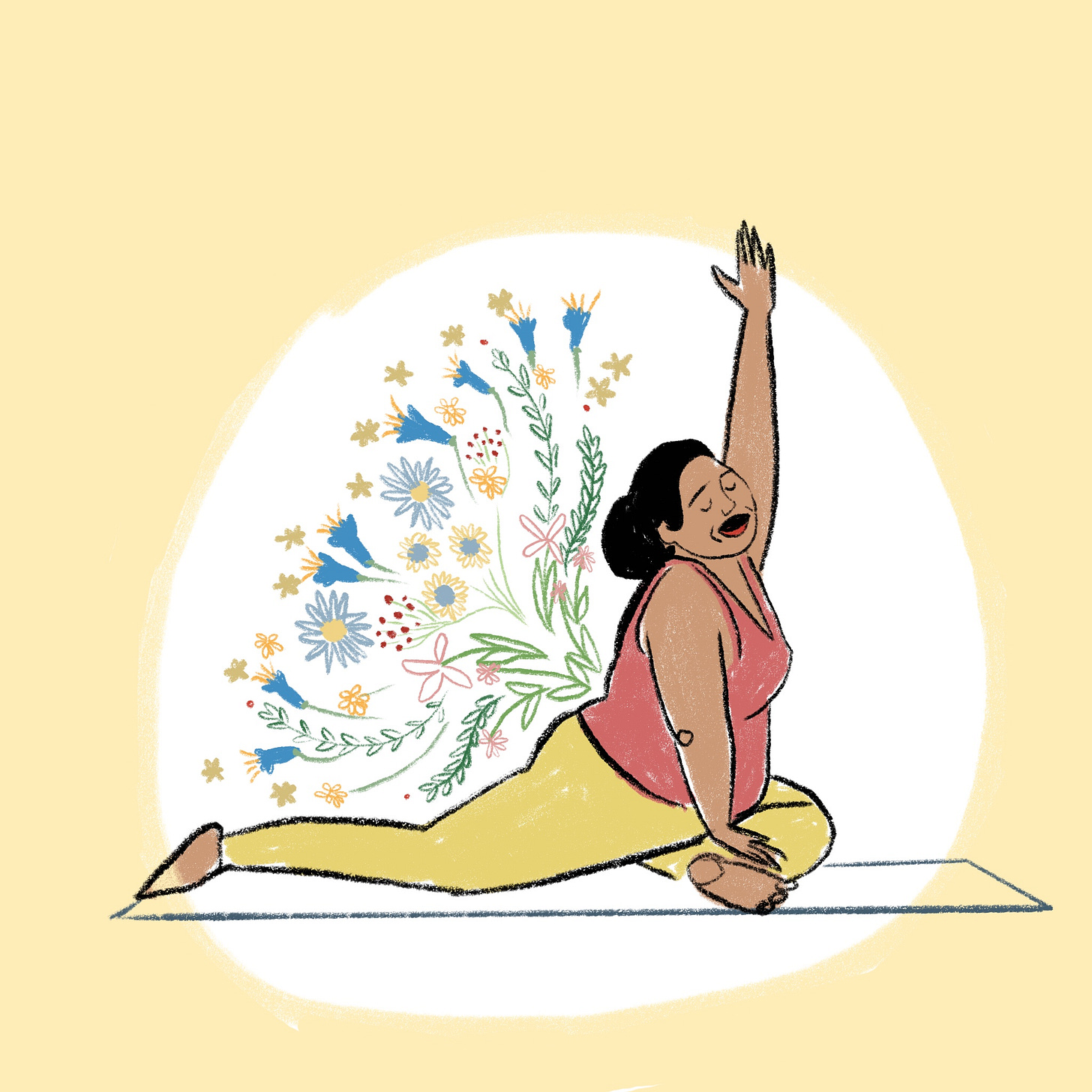
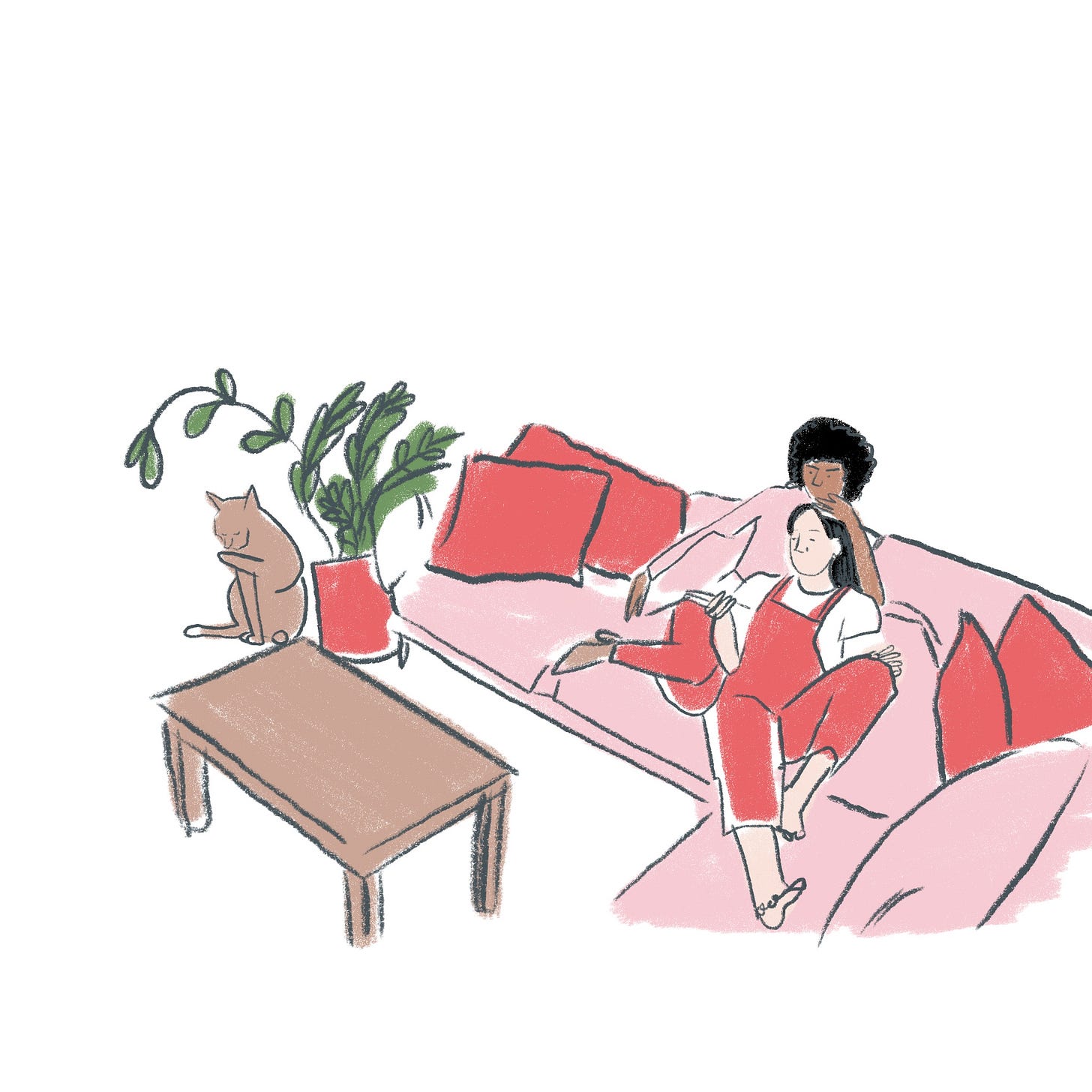

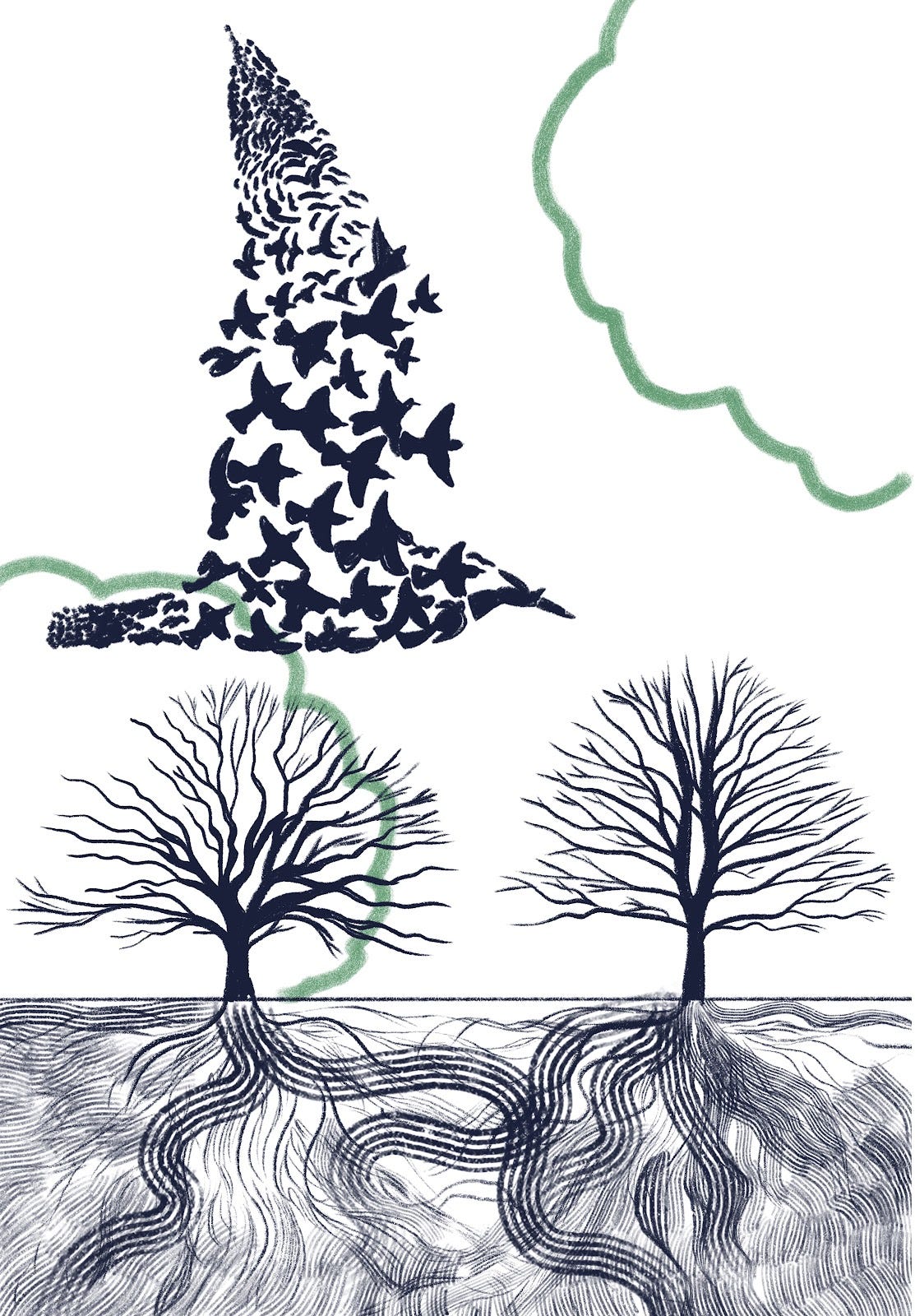

dear sophie,
this is great and you are great and thank you as always
i particularly love this: "You’re not going to become a giraffe overnight; it’s not possible."
tell that to a giraffe that's about to be born! or conceived! or become a giraffe from not having been a giraffe a moment ago, whenever that is!
thank you!
love
myq
Lovely post, thank you! I am forever struggling with craving routine and not wanting to become an automaton. I am going to save this post for inspiration.